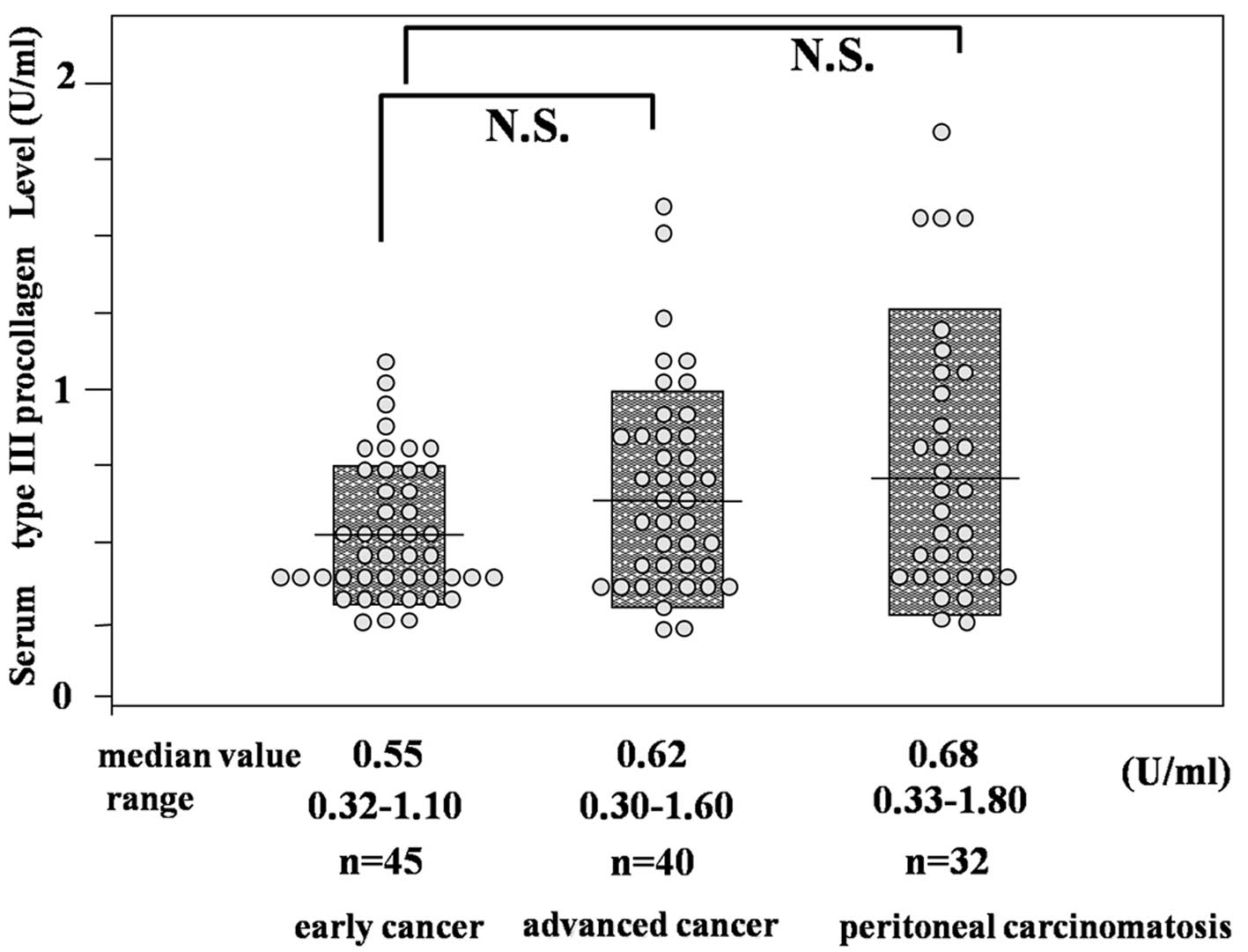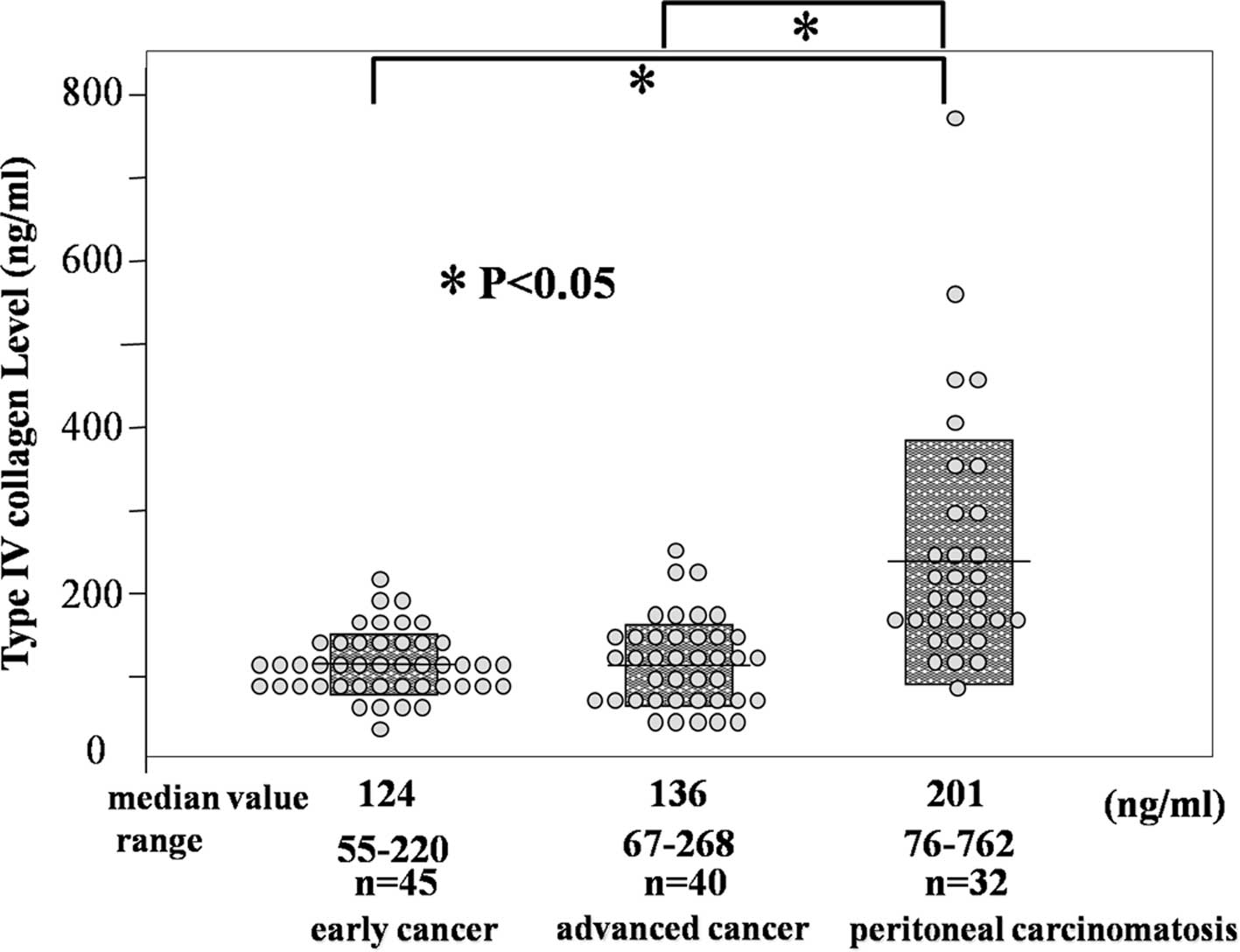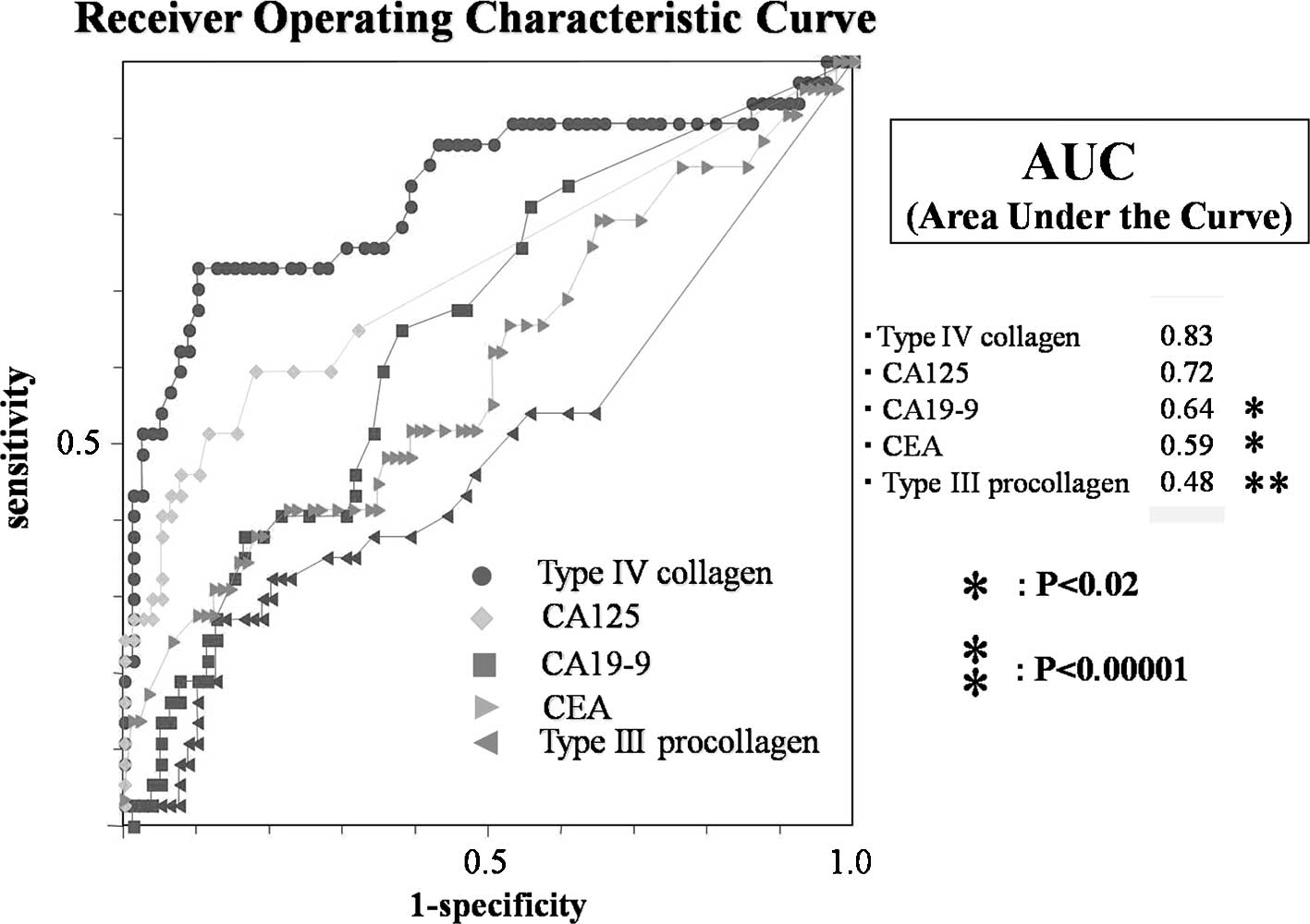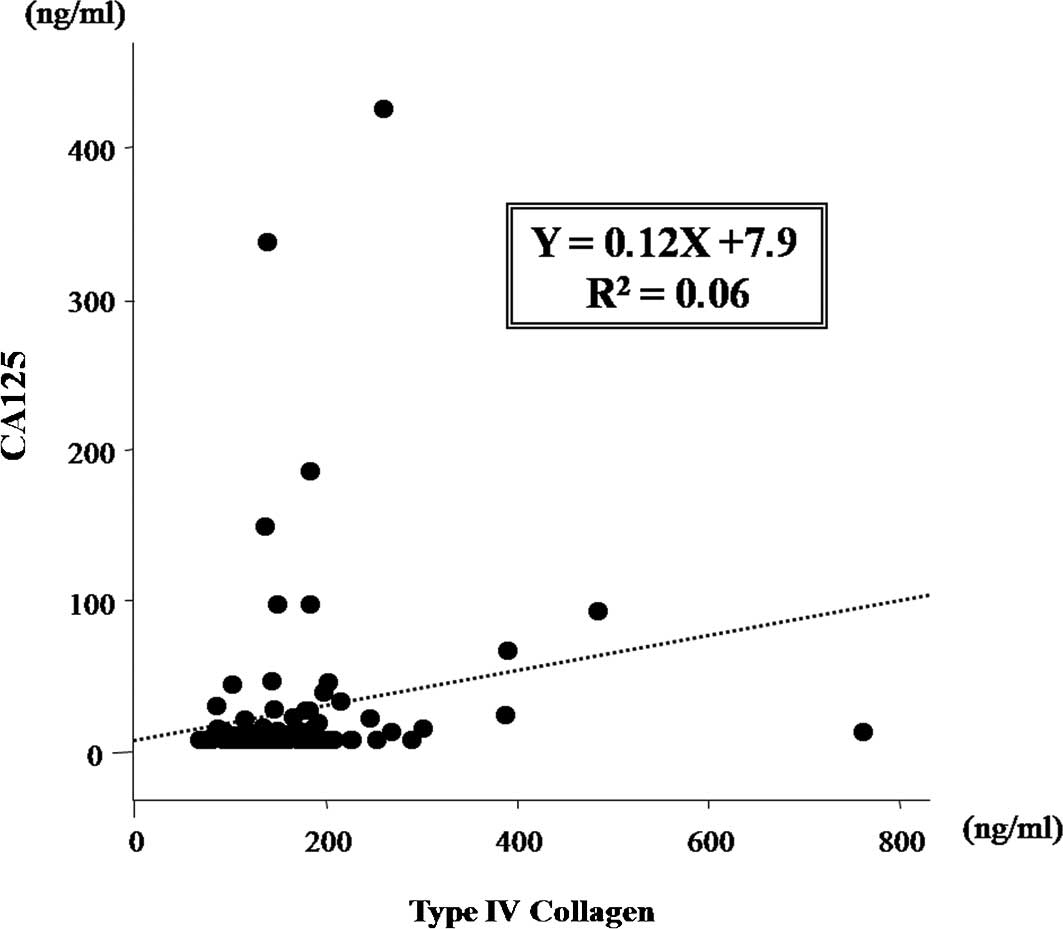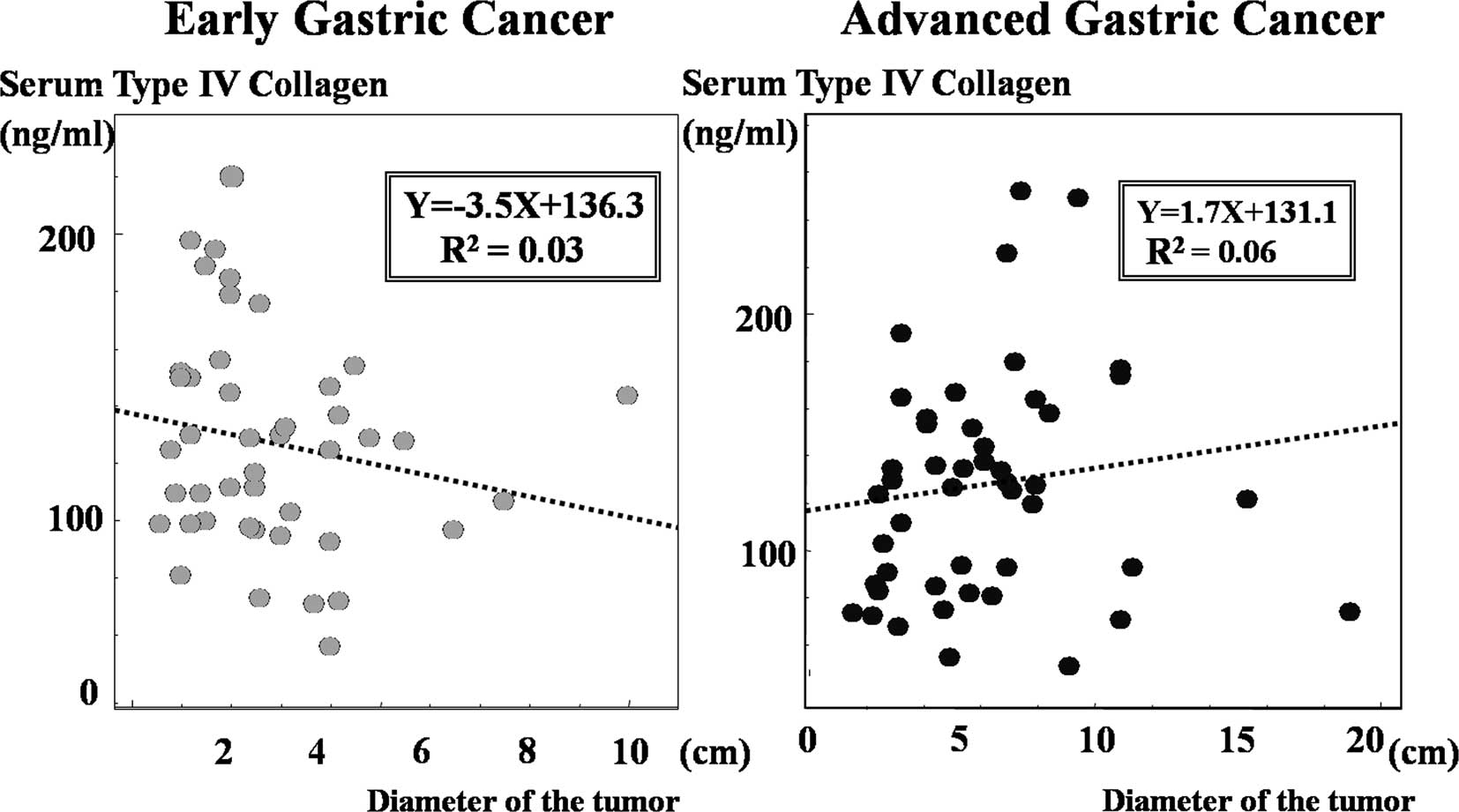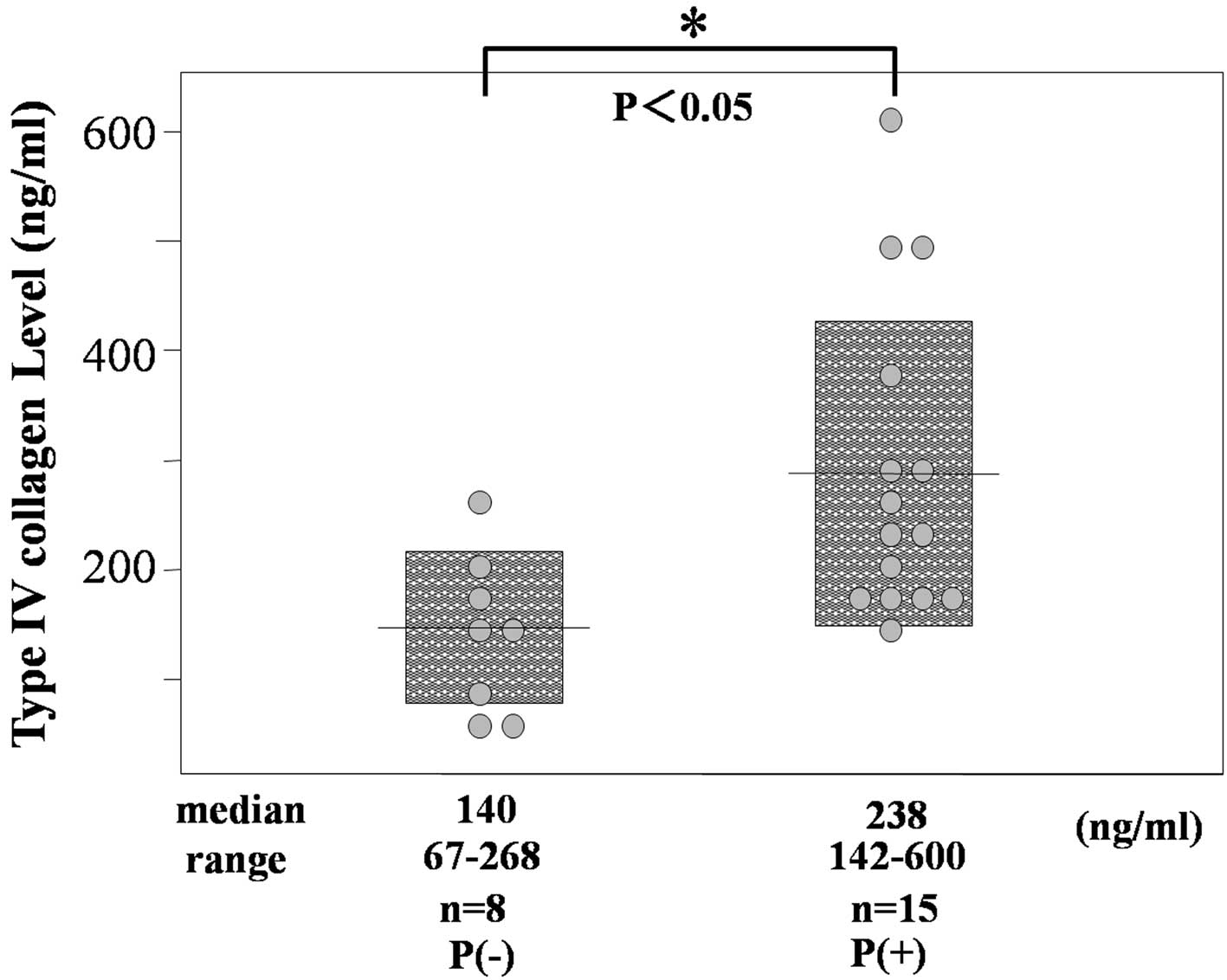|
1
|
Parkin DM, Pisani P and Ferlay J: Global
cancer statistics. CA Cancer J Clin. 49:33–64. 1999. View Article : Google Scholar
|
|
2
|
Yamazaki H, Oshima A, Murakami R, Endoh S
and Ubukata T: A long-term follow-up study of patients with gastric
cancer detected by mass screening. Cancer. 63:613–617. 1989.
View Article : Google Scholar : PubMed/NCBI
|
|
3
|
Ikeguchi M, Yamamoto O and Kaibara N:
Management protocol for scirrhous gastric cancer. In Vivo.
18:577–580. 2004.PubMed/NCBI
|
|
4
|
Chen CY, Wu CW, Lo SS, Hsieh MC, Lui WY
and Shen KH: Peritoneal carcinomatosis and lymph node metastasis
are prognostic indicators in patients with Borrmann type IV gastric
carcinoma. Hepatogastroenterology. 49:874–877. 2002.PubMed/NCBI
|
|
5
|
Van Cutsem E, Moiseyenko VM, Tjulandin S,
Majlis A, Constenla M, Boni C, Rodrigues A, Fodor M, Chao Y, Voznyi
E, Risse ML and Ajani JA; V325 Study Group. Phase III study of
docetaxel and cisplatin plus fluorouracil compared with cisplatin
and fluorouracil as first-line therapy for advanced gastric cancer:
a report of the V325 Study Group. J Clin Oncol. 24:4991–4997.
2006.PubMed/NCBI
|
|
6
|
Glehen O, Mohamed F and Gilly FN:
Peritoneal carcinomatosis from digestive tract cancer: new
management by cytoreductive surgery and intraperitoneal
chemohyperthermia. Lancet Oncol. 5:219–228. 2004. View Article : Google Scholar : PubMed/NCBI
|
|
7
|
Ishigami H, Kitayama J, Kaisaki S,
Hidemura A, Kato M, Otani K, Kamei T, Soma D, Miyato H, Yamashita H
and Nagawa H: Phase II study of weekly intravenous and
intraperitoneal paclitaxel combined with S-1 for advanced gastric
cancer with peritoneal metastasis. Ann Oncol. 21:67–70. 2010.
View Article : Google Scholar : PubMed/NCBI
|
|
8
|
Fushida S, Kinoshita J, Yagi Y, Funaki H,
Kinami S, Ninomiya I, Fujimura T, Nishimura G, Kayahara M and Ohta
T: Dual anti-cancer effects of weekly intraperitoneal docetaxel in
treatment of advanced gastric cancer patients with peritoneal
carcinomatosis: a feasibility and pharmacokinetic study. Oncol Rep.
19:1305–1310. 2008.
|
|
9
|
Yoshida K, Ninomiya M, Takakura N,
Hirabayashi N, Takiyama W, Sato Y, Todo S, Terashima M, Gotoh M,
Sakamoto J and Nishiyama M: Phase II study of docetaxel and S-1
combination therapy for advanced or recurrent gastric cancer. Clin
Cancer Res. 12:3402–3407. 2006. View Article : Google Scholar : PubMed/NCBI
|
|
10
|
Burke EC, Karpeh MS, Conlon KC and Brennan
MF: Laparoscopy in the management of gastric adenocarcinoma. Ann
Surg. 225:262–267. 1997. View Article : Google Scholar : PubMed/NCBI
|
|
11
|
Gretschel S, Siegel R, Estévez-Schwarz L,
Hünerbein M, Schneider U and Schlag PM: Surgical strategies for
gastric cancer with synchronous peritoneal carcinomatosis. Br J
Surg. 93:1530–1535. 2006. View
Article : Google Scholar : PubMed/NCBI
|
|
12
|
Sendler A, Dittler HJ, Feussner H, Nekarda
H, Bollschweiler E, Fink U, Helmberger H, Höfler H and Siewert JR:
Preoperative staging of gastric cancer as precondition for
multimodal treatment. World J Surg. 19:501–508. 1995. View Article : Google Scholar : PubMed/NCBI
|
|
13
|
Davies J, Chalmers AG, Sue-Ling HM, May J,
Miller GV, Martin IG and Johnston D: Spiral computed tomography and
operative staging of gastric carcinoma: a comparison with
histopathological staging. Gut. 41:314–319. 1997. View Article : Google Scholar : PubMed/NCBI
|
|
14
|
Düx M, Richter GM, Hansmann J, Kuntz C and
Kauffmann GW: Helical hydro-CT for diagnosis and staging of gastric
carcinoma. J Comput Assist Tomogr. 23:913–922. 1999.PubMed/NCBI
|
|
15
|
Yang QM, Bando E, Kawamura T, Tsukiyama G,
Nemoto M, Yonemura Y and Furukawa H: The diagnostic value of PET-CT
for peritoneal dissemination of abdominal malignancies. Gan To
Kagaku Ryoho. 33:1817–1821. 2006.PubMed/NCBI
|
|
16
|
Nakata B, Hirakawa YS, Chung K, Kato Y,
Yamashita Y, Maeda K and Onoda N: Serum CA 125 level as a predictor
of peritoneal dissemination in patients with gastric carcinoma.
Cancer. 83:2488–2492. 1998. View Article : Google Scholar : PubMed/NCBI
|
|
17
|
Yashiro M, Chung YS, Nishimura S, Inoue T
and Sowa M: Fibrosis in the peritoneum induced by scirrhous gastric
cancer cells may act as ‘soil’ for peritoneal dissemination.
Cancer. 77:1668–1675. 1996.PubMed/NCBI
|
|
18
|
Gabrielli GB and Corrocher R: Hepatic
fibrosis and its serum markers. Dig Dis. 9:303–316. 1991.
View Article : Google Scholar : PubMed/NCBI
|
|
19
|
Yamada S, Suou T, Kawasaki H and Yoshikawa
N: Clinical significance of serum 7S collagen in various liver
diseases. Clin Biochem. 25:467–470. 1992. View Article : Google Scholar : PubMed/NCBI
|
|
20
|
Jeffers LJ, Coelho-Little ME, Cheinquer H,
Vargas C, Civantos F and Alvarez L: Procollagen-III peptide and
chronic viral C hepatitis. Am J Gastroenterol. 90:1437–1440.
1995.PubMed/NCBI
|
|
21
|
Japanese Research Society for Gastric
Cancer. The General Rules for the Gastric Cancer Study. 12th
edition. Kanehara Shuppan; Tokyo: 1993
|
|
22
|
Kasuga I, Yonemaru M, Kiyokawa H, Ichinose
Y and Toyama K: Clinical evaluation of serum type IV collagen 7S in
idiopathic pulmonary fibrosis. Respirology. 1:277–281. 1996.
View Article : Google Scholar : PubMed/NCBI
|
|
23
|
Sato Y, Kataoka K, Matsumori A, Sasayama
S, Yamada T and Ito H: Measuring serum aminoterminal type III
procollagen peptide, 7S domain of type IV collagen, and cardiac
troponin T in patients with idiopathic dilated cardiomyopathy and
secondary cardiomyopathy. Heart. 78:505–508. 1997. View Article : Google Scholar
|
|
24
|
Guseva NG, Anikina NV, Myllylä R, Risteli
L, Risteli J and Chochlova JV: Markers of collagen and basement
membrane metabolism in sera of patients with progressive systemic
sclerosis. Ann Rheum Dis. 50:481–486. 1991. View Article : Google Scholar : PubMed/NCBI
|
|
25
|
Xu X, Wu Z, Zhou Q, Zhang Y and Wu D: The
role of determining the levels of serum collagen type IV in
diagnosing early diabetic nephropathy. Ren Fail. 24:747–753. 2002.
View Article : Google Scholar : PubMed/NCBI
|
|
26
|
Katayama M, Hino F, Kamihagi K, Sekiguchi
K, Titani K and Kato I: Urinary fibronectin fragments (a potential
tumor marker) measured by immunoenzymometric assay with
domain-specific monoclonal antibodies. Clin Chem. 37:466–471.
1991.
|
|
27
|
Basso D, Belluco C, Mazza S, Greco E,
Della Rocca F, Pauletto P, Nitti D, Lise M and Plebani M:
Colorectal cancer metastatic phenotype stimulates production by
fibroblasts of N-terminal peptide of type III collagen: clinical
implications for prognosis. Clin Chim Acta. 312:135–142. 2001.
View Article : Google Scholar
|
|
28
|
Mazouni C, Arun B, André F, Ayers M,
Krishnamurthy S, Wang B, Hortobagyi GN, Buzdar AU and Pusztai L:
Collagen IV levels are elevated in the serum of patients with
primary breast cancer compared to healthy volunteers. Br J Cancer.
99:68–71. 2008. View Article : Google Scholar : PubMed/NCBI
|
|
29
|
Akazawa S, Fujiki T, Kanda Y, Kumai R and
Yoshida S: Diagnostic values of serum type III procollagen
N-terminal peptide in type IV gastric cancer. Gan To Kagaku Ryoho.
12:861–866. 1985.PubMed/NCBI
|
|
30
|
Korenaga D, Orita H, Maekawa S, Itasaka H,
Ikeda T and Sugimachi K: Peritoneal collagen type IV concentration
in adenocarcinoma of the gastrointestinal tract and its
relationship to histological differentiation, metastasis, and
survival. Surg Today. 28:780–786. 1998. View Article : Google Scholar
|
|
31
|
Baker SG: The central role of receiver
operating characteristic (ROC) curves in evaluating tests for the
early detection of cancer. J Natl Cancer Inst. 95:511–515. 2003.
View Article : Google Scholar
|
|
32
|
Martinez-Hernandez A and Amenta PS: The
basement membrane in pathology. Lab Invest. 48:656–677. 1983.
|
|
33
|
Liotta LA: Tumor invasion and metastases –
role of the extracellular matrix. Cancer Res. 46:1–7. 1986.
|
|
34
|
Meyer T and Hart IR: Mechanisms of tumor
metastasis. Eur J Cancer. 34:214–221. 1998. View Article : Google Scholar
|
|
35
|
Conway JG, Trexler SJ, Wakefield JA,
Marron BE, Emerson DL and Bickett DM: Effect of matrix
metalloproteinase inhibitors on tumor growth and spontaneous
metastasis. Clin Exp Metastasis. 14:115–124. 1996. View Article : Google Scholar : PubMed/NCBI
|
|
36
|
Heppner KJ, Matrisian LM, Jensen RA and
Rodgers WH: Expression of most matrix metalloproteinase family
members in breast cancer represents a tumor-induced host response.
Am J Pathol. 149:273–282. 1996.PubMed/NCBI
|
|
37
|
Mori M, Mimori K, Shiraishi T, Fujie T,
Baba K, Kusumoto H, Haraguchi M, Ueo H and Akiyoshi T: Analysis of
MT1-MMP and MMP2 expression in human gastric cancers. Int J Cancer.
74:316–321. 1997. View Article : Google Scholar : PubMed/NCBI
|
|
38
|
De Mingo M, Morán A, Sánchez-Pernaute A,
Iniesta P, Díez-Valladares L, Pérez-Aguirre E, de Juan C,
García-Aranda C, Díaz-López A, García-Botella A, Martín-Antona E,
Benito M, Torres A and Balibrea JL: Expression of MMP-9 and TIMP-1
as prognostic markers in gastric carcinoma. Hepatogastroenterology.
54:315–319. 2007.PubMed/NCBI
|
|
39
|
Duffy MJ, Maguire TM, Hill A, McDermott E
and O’Higgins N: Metalloproteinases: role in breast carcinogenesis,
invasion and metastasis. Breast Cancer Res. 2:252–257. 2000.
View Article : Google Scholar : PubMed/NCBI
|
|
40
|
Kenny HA, Kaur S, Coussens LM and Lengyel
E: The initial steps of ovarian cancer cell metastasis are mediated
by MMP-2 cleavage of vitronectin and fibronectin. J Clin Invest.
118:1367–1379. 2008. View
Article : Google Scholar : PubMed/NCBI
|
|
41
|
Sun XM, Dong WG, Yu BP, Luo HS and Yu JP:
Detection of type IV collagenase activity in malignant ascites.
World J Gastroenterol. 9:2592–2595. 2003.PubMed/NCBI
|
|
42
|
Minamoto T, Ooi A, Okada Y, Mai M, Nagai Y
and Nakanishi I: Desmoplastic reaction of gastric carcinoma: a
light-and electron-microscopic immunohistochemical analysis using
collagen type-specific antibodies. Hum Pathol. 19:815–821. 1998.
View Article : Google Scholar
|















